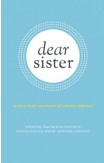Dear Sister: The connections between sexual violence and feminism’s toxicity
By Mandy Van Deven & Lisa Factora-Borchers
If you want to know the future of online feminism, you have to know its past. Since no one has produced a comprehensive history yet—publishers, call me!—the void has been filled with false starts and near misses, most of which do little more than fan the flames of an already well-fueled inferno. Claims about online feminism’s toxicity often conflate the medium with the message, blaming technology and ignoring context completely. But conflicts over silencing and exclusion have existed throughout feminism’s history, and the Internet is the latest platform for these arguments to play out. In reimaging a feminist praxis that centers inclusion and accountability, we might find value in looking to other models of transformation, such as those created to enable survival and healing.
Dear Sister: Letters from Survivors of Sexual Violence is a collection of confessions and contemplations that bear witness to the experience of being torn down and the work of building back up. While the focus is on providing support for sexual violence survivors, the book also exemplifies the coexistence of conflicting voices as complimentary not competing. It establishes a framework that allows for deconstructing, yet pushes the deconstruction to produce value beyond simple critique.
I find the parallels between sexual violence and feminism’s toxicity to be abundant and striking. Both are systematically embedded to the point of invisibility. Both are hell bent on annihilation. And both require the deep, scary, and sustained work of community accountability. The first step is learning how we got here. The next is a leap of faith.
Can you explain the relationship Dear Sister has with online feminism?
When I finished college in 2001, I was an eager and idealistic activist with no online presence beyond an email account. After I started blogging, I saw a big divide between online feminism and offline activism, and I didn’t think the two were ever going to merge. My work in legal and medical advocacy was really the genesis of Dear Sister, but looking back now, it’s hard to separate online and offline because the idea for the book—and my confidence in my ability to fulfill this project—was solidified through the relationships I made on feminist blogs.
Even though some of these relationships deepened over time, so much of what I learned about online feminism wasn’t congruent with what I wanted to put into the world. It was amazing to be part of online communities and read the brilliant work of so many women of color, but there was also a lot of energy, resources, and time that we had to put into defending our own spaces and thoughts. So, I wanted to build something that had nothing to do with mainstream feminists’ perspectives.
How did Dear Sister end up being what you chose to build?
I knew I wanted to develop my writing, and it was an intuitive, almost spiritual decision that I couldn’t commit to my own craft until I edited this book. I could never talk about this decision without mentioning Alexis Pauline Gumbs who helped forge the project by asking me to write a letter to someone in her community who had been raped. That got me thinking about how amazing it would be if someone put together a book of letters and poems to let survivors know they aren’t alone. At that point, it wasn’t going to be me—but the idea haunted me because I wanted that book to exist so badly. Eventually, I got so sick of waiting for someone else to do it and decided I’d do it myself.
I didn’t know what format it would take initially, if it would be a zine or an online gallery; I had so many different ideas. In the end, I chose traditional publishing because I didn’t completely trust where online projects were going. In the blink of an eye, projects were thwarted and disappeared. I wanted something more tangible and lasting. Everyone I spoke with always applauded the effort, but I don’t think anyone—including myself—really believed it would be published as a book.
How did you decide who would build Dear Sister with you?
I had a relationship with three of the contributors—Sydette Harry, @brownfemipower, and Alexis—prior to the call for submissions, which I sent out in 2010. I thought I’d get fifteen or twenty submissions; instead, I got more than a hundred. More came in after the deadline had passed.
The writing was so powerful, and it wasn’t coming from established authors or online feminists; these were everyday people who were moved by the call for submissions. I wasn’t specifically looking for self-identified feminists to contribute to the book. I wanted it to be a look at the world through the eyes of a survivor. The rawness of the writing was really appealing to me.
Once I saw how people were responding, I knew the project hit a nerve. So many people had conflicting thoughts, and I got a lot of emails disagreed with the project. Some thought it was problematic that the focus was on women instead of opening up the landscape to all survivors. I felt receiving that kind of critical response was a good thing.
Most folks don’t take kindly to their work being questioned. Why did you embrace the critical feedback you received and even incorporate it into the book?
If someone is going to expend the energy to give me feedback—even if it’s harsh feedback—I think their perspective is worth my consideration. That’s just how I approach learning; I don’t assume I know everything about what I’m doing, and I always assume there’s something to learn from any reaction.
Also, I think I’m pretty good at determining whether a criticism is valid or reactive. A lot of the feedback I received was valid, even if it was sent in anger. I was able to see past the anger and get to the heart of the critique. When the heart is something constructive, I would be a fool to ignore it.
So, what were the critiques you received and how did you respond?
The first of the two main critiques I received was that the language in the call for submissions wasn’t inclusive of transpeople, so I amended it to be more open by using “women-identified survivors” instead of “women.” I also got a lot of people who asked why I wasn’t including male survivors, which helped me think through and solidify why I wanted to focus on women-identified survivors when I know there are survivors of all genders. As an editor, this helped me become more deliberate about my focus and accept my limitations. The landscape of survival is much more complex than one book, and one book can’t be everything to every survivor.
I think there’s something to be gained by talking about how embracing our missteps and blind spots can facilitate an organic growth process. Very little in our lives—or our social movements—is actually perfectly planned.
I wish I could say I knew what I was doing and that the process of editing Dear Sister was seamless—but it wasn’t. A lot of the time I felt like I had no idea what I was doing, and I wished I had a model to guide me. In the end, I chose the submissions I wanted to give to someone who was struggling. I thought about specific people I’d worked with or friends who’d told me they were raped. I asked myself what I wanted them to know, and I tried to find that among the stories and poems. That was my compass.
Something I appreciate about Dear Sister is that many of the pieces have conflicting points of view. For example, some writers talk about using the criminal justice system while others talk about being re-victimized by law enforcement and social service agencies. What is the value in lifting up different experiences of survival?
That these stories conflict speaks to the mixed landscape of survivorship and the fact that there is no blueprint for survival. Everyone has their own ideas about who a survivor is, how they should cope with their grief, and what they need to do to heal. Frankly, that’s all bullshit. Each person has a different prescription for survival, and truly believing that means accepting the conflict and sitting with the tension that someone is going to choose something you would not.
I didn’t entirely realize how different the voices were until I was finishing the book, but I think it’s so profound to have so many threads of survivorship together in one place. Mia Mingus talks about the connections between transformative justice and disability. Aishah Shahidah Simmons writes about why it’s important for survivors to have access to safe and legal abortion. adrienne maree brown has this amazing piece about a period of chosen celibacy to regain her sense of strength. These people all chose to survive in different ways, and they all used different tools to do so.
When a survivor steps forward and explains which tools she used to survive, she teaches us something about hope and healing. This is already happening in our communities, but what’s become clear to me during the book tour is that there’s a deficiency of facilitated spaces in which we can have conversations about how to heal from sexual violence. I think if we had more of those, we’d see a lot more hope.
What kinds of conversations are you having on the book tour about surviving and healing from sexual violence?
Many of the people attending the book tour events are not survivors; they are activists, family, and friends who want to learn how to support survivors. They ask really sincere questions about how to connect with someone who’s going through something they can’t imagine. I tell them that we don’t have to know exactly what someone is going through to be a good friend. Not having the answers and saying you don’t is so much more amazing than pretending like you do. The work is in continuing to try to be supportive without having scripts that tell us exactly what to say or do.
People gravitate toward scripts and similarity because they give us comfort, but we don’t have to be comfortable to be human. I hope we learn how to get comfortable enough to let go of the idea that we need scripts. But getting rid of scripts requires a sense of safety. We tend to associate safety with knowing what to do; we want policies and protocols that tell us have to navigate our lives. It is infinitely harder to accept that having scripts isn’t working. We’ve become so reliant on traditional ways of thinking about violence and justice and healing that it’s difficult to even imagine that our communities can change and grow. I don’t mean “community” in an abstract, global sense; I mean very specific communities, like our families and the people we work with.
Most people know the systems we have aren’t working—particularly for women without certain kinds of privilege—and that the majority of us are left to cross our fingers and hope for justice that doesn’t come. I don’t know exactly where the alternatives to our current systems are going to come from, but I know there is a lot of unrest, and as more “regular people” recognize how our culture consistently apologizes for and protects sexual violence, that unrest will grow. I’m hopeful this will lead to better processes and accountability.
In the four-year-long journey from submissions to book tour, what have you learned from Dear Sister?
The book tour has really been a transformative experience. I was so ready to meet and talk to people about this issue, and the people who’ve come to the events have been wonderful. Something I knew when the book tour began, but I didn’t realize the toll it would take on me, is how difficult it is to hold the emotions and memories of all of the conversations I’m having about sexual violence. That trauma has an almost molecular existence that is palpable in the room when you’re talking about it. I’ve become aware of having a level of bodily exhaustion, and I’m trying to figure out how to hold it. The reality is that it is too big for any one person to hold; healing this trauma is meant for whole communities, because that is the only body big enough to shoulder it.
____________________________________________________________
 Mandy Van Deven is a writer, editor, and digital strategist. Her work has been published in The Guardian, Salon, GlobalPost, The Progressive, and Marie Claire. Learn more at mandyvandeven.com.
Mandy Van Deven is a writer, editor, and digital strategist. Her work has been published in The Guardian, Salon, GlobalPost, The Progressive, and Marie Claire. Learn more at mandyvandeven.com.





Pingback: Beyond the Beyond: closing and opening - The Feminist Wire | The Feminist Wire